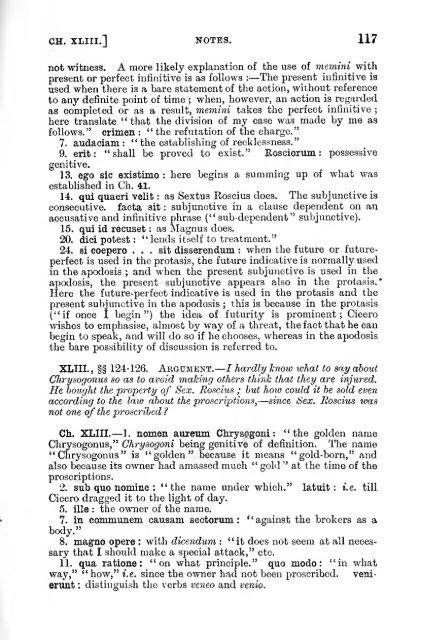Pro S. Roscio Amerino
Pro S. Roscio Amerino
Pro S. Roscio Amerino
You also want an ePaper? Increase the reach of your titles
YUMPU automatically turns print PDFs into web optimized ePapers that Google loves.
CH. XLIII.] NOTBS. 117<br />
not witness. A more likely explanation of the use of memini with<br />
present or perfect infinitive is as follows :—The present infinitive is<br />
used when there is a bare statement of the action, without reference<br />
when, however, an action is regarded<br />
to any definite point of time ;<br />
as eompleted or as a result, memini takes the perfect infinitive ;<br />
here translate " that the division of my case was made by me aa<br />
foUows." crimen : " the refutation of the charge."<br />
7. audaciam : " the establishing of recklessness."<br />
9. erit: " shall be proved to exist." <strong>Roscio</strong>rum : possessive<br />
genitive.<br />
13. ego sic existimo : here begins a summing up of what was<br />
established in Ch. 41.<br />
14. qui quaeri velit : as Sextus Roscius does. The subjunctive is<br />
consecutive. facta sit : subjunutive in a clause dependent on an<br />
accusative and infinitive phrase (" sub-dependent" subjunctive).<br />
15. qui id recuset : as Magnus does.<br />
20. dici potest : " lends itself to treatment."<br />
24. si coepero . . . sit disserendum : when the future or futureperfect<br />
is used in the protasis, the future indieative is normally used<br />
in the apodosis ; and when the present subjunctive is used in the<br />
apodosis, the present subjunctive appears also in the protasis.*<br />
Here the future-perfect indieative is used in the protasis and the<br />
present subjunctive in the apodosis ; this is because in the protasis<br />
("if once I begin ") the idea of futurity is prominent ; Cicero<br />
wishes to emphasise, almost by way of a threat, thefact that he can<br />
begin to speak, and will do so if he chooses, whereas in the apodosis<br />
the bare possibility of discussion is referred to.<br />
XLIII., §§ 124-126. Argdment.—I hardly hiow what to say ahout<br />
Chrysogonus so as to avoid making others think that they are injured.<br />
He bought the property of Sex. Roscius ; but how could it be sold even<br />
according to the laio about the proscriptions,— since Sex. Boscius was<br />
not one of the proscribed ?<br />
Ch. XLIII.— 1. nomen aureum Clirys||goni : " the golden name<br />
Chrysogonus," Ghrysogoni being genitivife of definition. The name<br />
" Chrysogonus " ia " golden "..beCanSe it means "gold-born," and<br />
also because its owner had amassed much " gold " at the time of the<br />
proscriptions.<br />
2. sub quo nomine " : the name under which." latuit : i.e. till<br />
Cicero dragged it to the light of day.<br />
5. ille : the owner of the name.<br />
7. in communem causam sectomm :<br />
'<br />
' against the brokers as a<br />
body."<br />
8. magno opere : with dicendum : "it does not seem at all necessary<br />
that I should make a special attack," etc.<br />
11. qua ratione : " on what principle." quo modo : "in what<br />
way," "how," i.e. since the owner had not been proscribed. venierunt<br />
: distinguish the verbs veneo and venio.

















